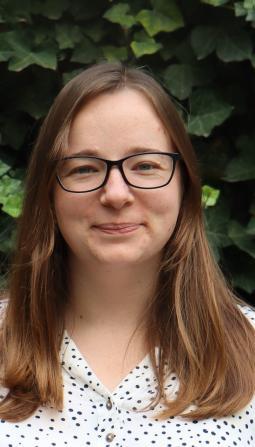
Cancer Mission: The role of regions, Health WG meeting
The Health Working Group is hosting a meeting that will explore the role of Regions in the Cancer Mission. The meeting will take place from 14:00-16:00 on 17 April 2024 at the ERRIN offices, Rue du Luxembourg 3 (8th floor), 1000 Brussels.
This joint meeting between the ERRIN Health Working Group and the EUREGHA Cancer Working Group will explore the opportunities and role of regions within the Cancer Mission. Multiple examples of current practices from within the networks will be presented, showcasing how regions can effectively participate in the Cancer Mission. Following the examples, there will be an update on the Mission and future opportunities from the Cancer Mission Secretariat and the ECHoS National Cancer Misson Hubs project on regional engagement. There will be a chance for questions on how members can engage in the Mission, both now and in the future.
- 17/04/2024 - 14:00 - 17/04/2024 - 16:00
-
ERRIN
3 Rue du Luxembourg
1000 Brussels
Belgium - Lucy Hammond
-
Working Group
Partner Search Interreg Europe – Tuscany Region - Exchange of experiences on affordable housing enhancement
- Antonella Pollazzi
- 21/03/2024
-
Funding ProgrammeINTERREG Europe
-
Deadline for Expression of Interest12 April 2024
-
NameBesnik MehmetiOrganisation NameANCI Toscana
- Get in Touch
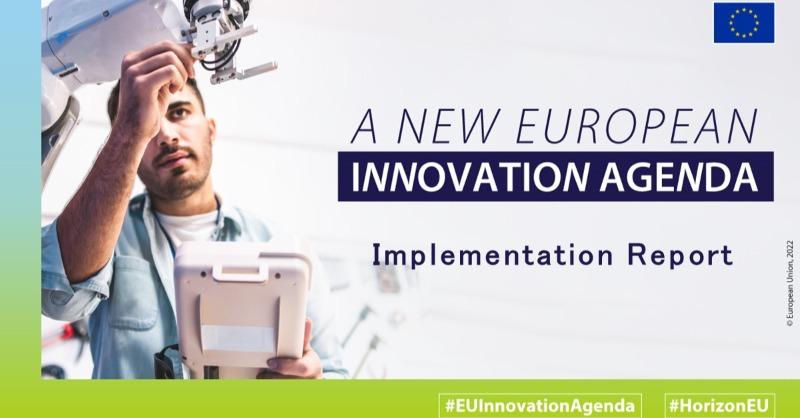
NEIA implementation report & Regional Innovation Valleys update
In July 2022, the European Commission adopted the New European Innovation Agenda (NEIA) with the aim of positioning Europe at the forefront of the new wave of deep tech innovation and start-ups. The document set out 25 actions under five flagships whose implementation has been monitored via a dedicated roadmap.
Almost two years later, during the EU R&I Days on 20 March 2024, the first report on the NEIA state of play was published by the European Commission. The document titled “New European Innovation Agenda on the move” takes stock and presents progress on the NEIA actions, marking 13 of them as completed and the other 12 as ongoing. Among the ongoing actions is one on Regional Innovation Valleys for regions committed to concentrate their R&I efforts on specific priorities and to strengthen their coordination with other regions, which ERRIN has been particularly advocating.
Key NEIA deliverables include: new directives proposed in access to finance for scale-ups and SMEs; actions to attract institutional investors; initiatives to promote innovation procurement and experimentation spaces (such as regulatory sandboxes); the reinforcement of innovation ecosystems and addressing the innovation divide through the development of innovation-oriented networks of regions; skills development.
The NEIA report also includes over 200 measures announced by Member States and Associated Countries in support of the NEIA. The measures where mapped by the EIC Forum, where representatives of Member States and Associated Countries present and discuss innovation policies and instruments, and where ERRIN also participates as a stakeholder.
Regarding Regional Innovation Valleys (RIVs), over 150 regions are on track to be granted the title. More than 250 innovation stakeholders in these regions are expected to receive a total of over EUR 115 million of EU funding and committed to co-fund another EUR 77 million from private and public sources. 170 applicants from 140 regions expressed interest in becoming RIV through the call for EoI, while the first coordinated calls under Horizon Europe (EIE) and the European Regional Development Fund (I3) with a total budget of EUR 122 million gathered over 50 proposals with close to 1000 participants from 25 Member States and 6 Associated Countries.
The Commission plans to officially announce the names of the successful regions in summer this year.
Meanwhile, a debate on the way forward for RIVs was held during the EU R&I Days following the launch of the NEIA report. Almost two years after the first announcement of the initiative, the participants reflected on what makes RIVs special? What to improve? Why to apply? ERRIN Director Pirita Lindholm and ERRIN Smart Specialisation Working Group Leader Rasmus Bergander from Central Sweden European Office joined the panel alongside representatives of the Commission’s DG RTD and DG REGIO, and the European Committee of the Regions. Find out what Pirita and Rasmus shared in this LinkedIn post or watch the full debate here or below.
We were proud to have ERRIN’s work around RIVs and our members' achievements recognised!
ERRIN submitted input to the call for evidence for NEIA in May 2022 and has been closely engaged in the developments around the Agenda since its following launch. We have been particularly supporting NEIA flagship three on Accelerating and strengthening innovation in European Innovation Ecosystems across the EU and the linked initiative of identifying up to 100 Regional Innovation Valleys, organising dedicated events and engaging in discussions, including in the EIC Forum Working Group on Innovation Policy.
- Ewa Chomicz
- 22/03/2024
-
Members
Ewa Chomicz
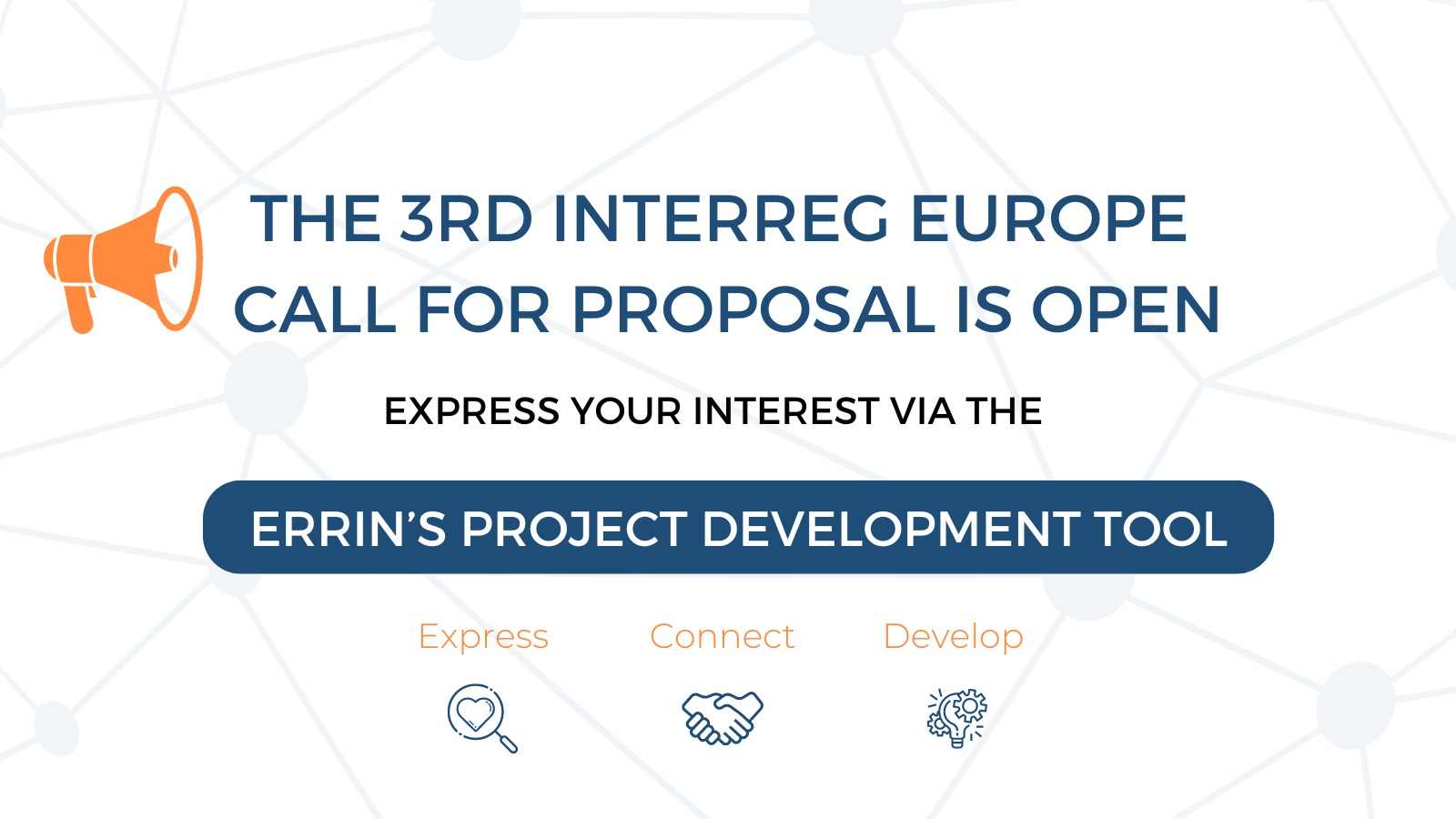
Express your interest in the 3rd Interreg Europe call via the ERRIN Project Development Tool
Interreg Europe has officially launched its 3rd call for proposals on 20 March, dedicated to fostering interregional cooperation projects.
These initiatives bring together policy-relevant organisations from across Europe to jointly address common regional development challenges. The initial three years of these projects, called the core phase, focus on facilitating the exchange and transfer of expertise among participating partners to enhance the targeted policy instruments. In the fourth and final year, known as the 'follow-up phase,' regions concentrate on monitoring the outcomes and impact of their collaboration.
ERRIN's Project Development Tool is now available for interested organisations to express interest, search for project coordinators and seek partners, with several parties already sharing their interest in the Interreg Europe call. Click here to see the current Partner Searches and Expressions of interest!
Serving as a centralised platform, the Tool enables our members and their regional stakeholders to express their interest in various funding opportunities and engage with other members who share similar interests in the ongoing calls.
Applications remain open until 7 June 2024 (12:00 noon CEST – Paris time). More details on the call are available on the dedicated website.
- Silvia Ghiretti
- 21/03/2024
Silvia Ghiretti
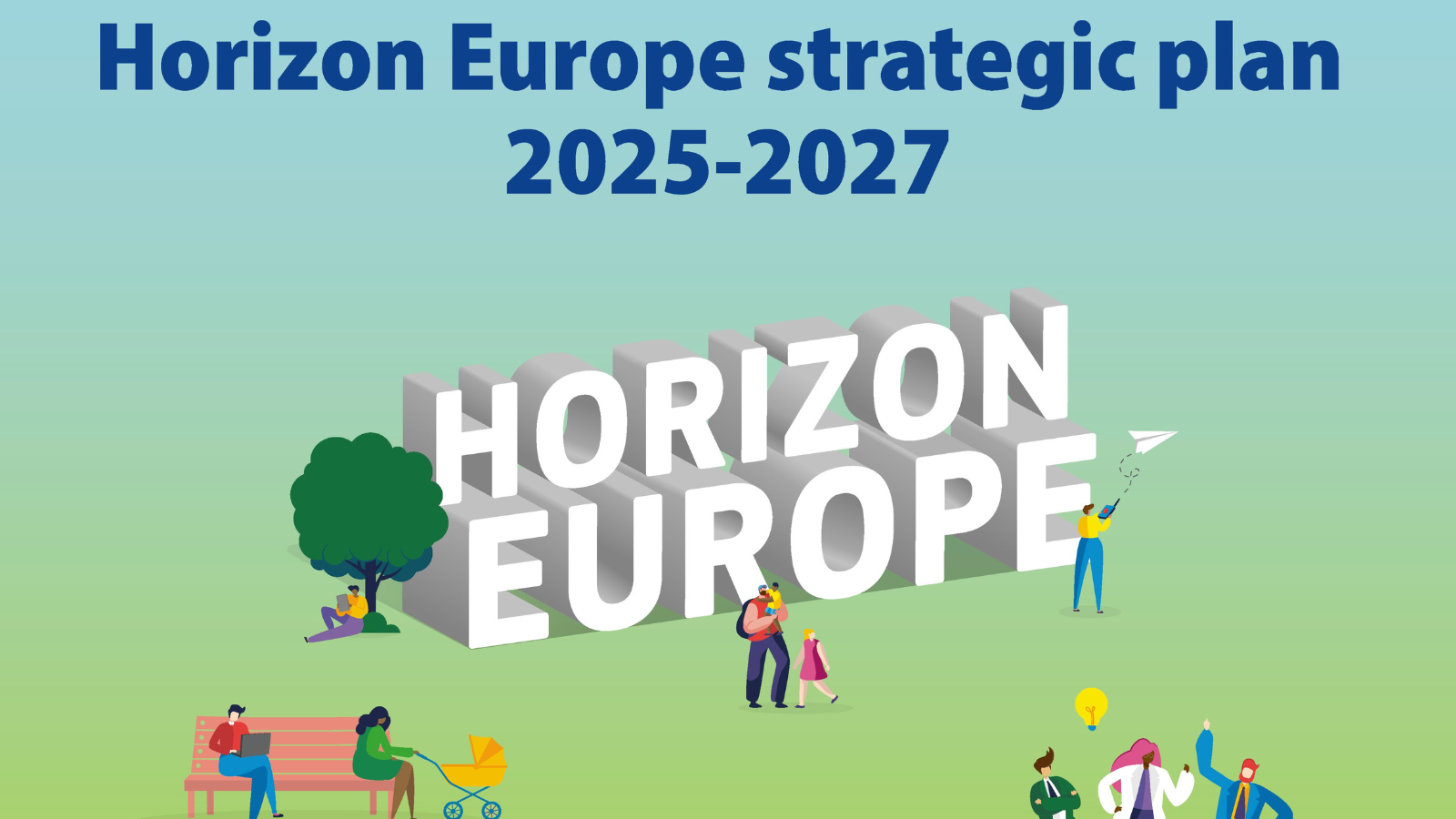
Horizon Europe strategic plan 2025-2027 is out
Yesterday, the Commission adopted the second Horizon Europe strategic plan 2025-2027. The plan sets out the key strategic orientations for the EU's research and innovation funding for the last three years of the programme (2025-2027).
What novelties does the new strategic plan bring compared to the current 2021-2024 one?
-
Turning the four key strategic orientations into overarching, interlinked and less prescriptive three key strategic orientations encapsulating the main EU policy priorities: green transition; digital transition; and a more resilient, competitive, inclusive and democratic Europe;
-
Transforming ‘open strategic autonomy’ and ‘securing Europe’s leading role in developing and deploying critical technologies’ (in particular those identified in the list of critical technologies proposed by the Commission in the context of the European Economic Security Strategy) into overarching principles that apply across all three key strategic orientations;
-
Simplifying the impact logic by removing the ‘impact areas’ to reduce complexity and focus on the expected impacts;
-
Strengthening the coverage of Pillar I (‘Excellent Science’), Pillar III (‘Innovative Europe’) and the ‘Widening Participation and Strengthening the ERA’ part to ensure better consistency between all parts of Horizon Europe, while respecting their specific objectives;
-
Introducing new sections on specific issues, in particular synergies, balance between R&I and social innovation;
-
Identifying the New European Bauhaus as a cross-cluster issue and its components for 2025-2027;
-
Identifying nine new European Partnerships: five co-funded (Brain Health; Forests and Forestry for a Sustainable Future; Raw Materials for the Green and Digital Transition; Resilient Cultural Heritage; Social Transformations and Resilience) and four co-programmed (Innovative Materials for the EU; Solar Photovoltaics; Textiles of the Future; Virtual Worlds)
-
Taking stock of the implementation of the five EU Missions and outlining the next steps to deploy these missions and ensure they are impactful, linking to strengthening and better coordinating administrative governance; broader portfolio of instruments; and broader public support and acceptance;
-
Addressing the latest developments since the first strategic plan, particularly the new geopolitical situation and security concerns;
-
Adding a new section on research security to highlight the existing tools within Horizon Europe to mitigate risks related to research security.
Read the Commission press release here and find the Horizon Europe strategic plan 2025-2027 here.
The strategic plan sets out the policy priorities for Horizon Europe, as well as expected impacts. It is the basis for the work programmes covering Pillar II of Horizon Europe and its call topics. One important aim of the strategic plan is to promote consistency between the work programmes, EU, and national priorities and to achieve continuity and coherence of funding measures beyond the (bi-)annual duration of work programmes. The first, current strategic plan covers the period 2021-2024.
The second strategic plan for 2025-2027 builds on an extensive analysis conducted by the Commission services, the Horizon Europe strategic plan 2025–2027 analysis. It was co-created by Commission services and co-designed with Member States and Associated Countries, the European Parliament and more than 2000 stakeholders and citizens, who have contributed at various stages of the strategic planning process for Horizon Europe, such as the largest ever public consultation on European Research and Innovation Framework Programmes, to which ERRIN also submitted input.
The new plan is an important milestone on the path towards the next European Framework Programme for R&I (FP10) - the process actively followed by ERRIN through dedicated work.
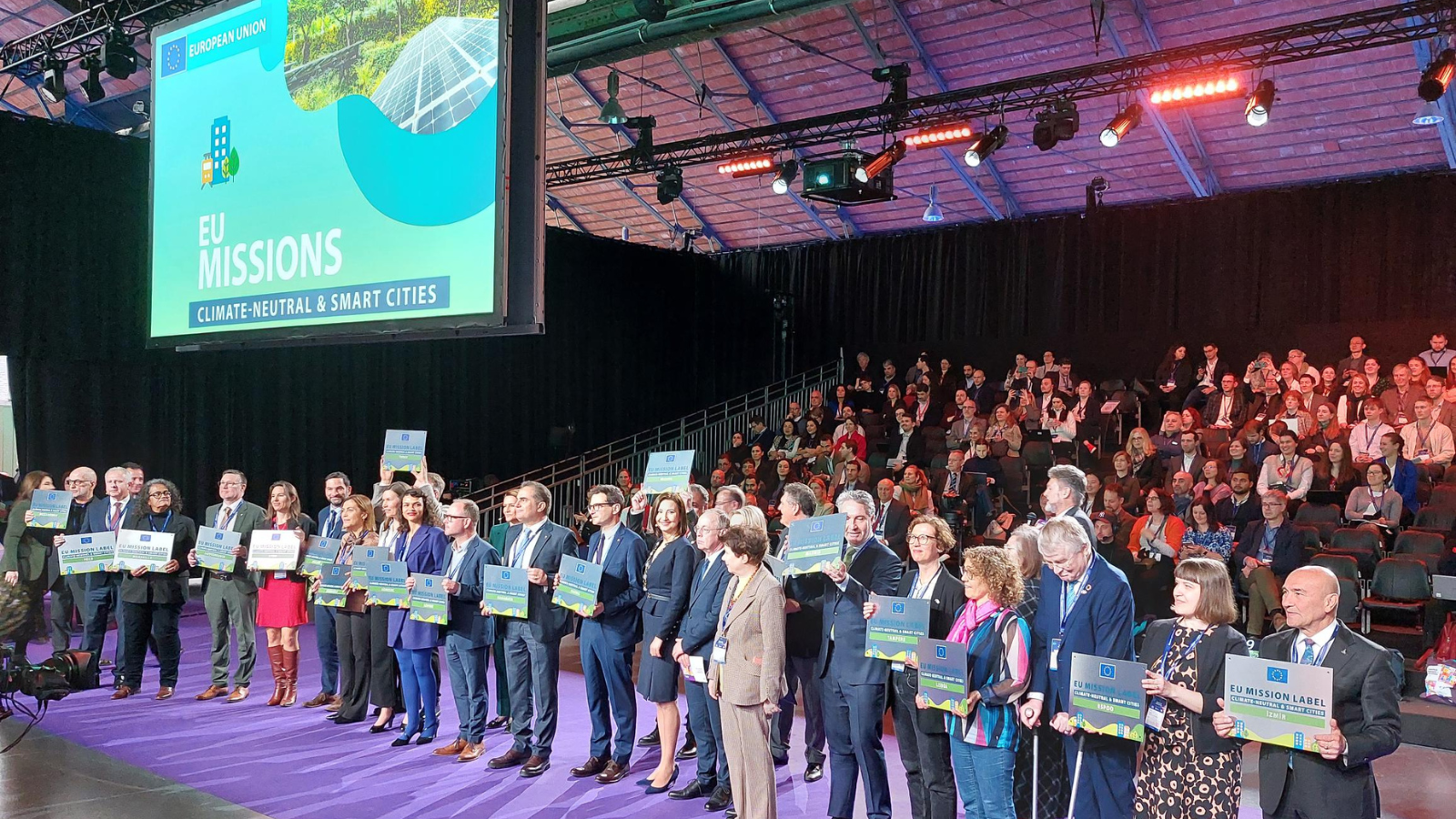
23 new Mission Cities awarded the Mission Label
During a dedicated session at the EU Research & Innovation Days, 23 new cities part of the EU Mission on 100 climate-neutral and smart cities were awarded the Mission Label for their plans to achieve climate neutrality by 2030. The Mission Label was awarded by Iliana Ivanova, Commissioner for Innovation, Research, Culture, Education and Youth.
The Mission Label recognises a city’s work in successfully developing its Climate City Contract, consisting of the city’s vision for and commitment to climate neutrality, an action plan, and an investment plan. Further, it serves as a catalyst for facilitating access to both public and private funding to support the city's ambitious goals. The first ten cities received their Mission Label in October 2023.
ERRIN is pleased to see that 15 cities are located in ERRIN member regions:
- Barcelona (ES)
- Espoo (FI)
- Florence (IT)
- Guimarães (PT)
- Heidelberg (DE)
- Lahti (FI)
- Leuven (BE)
- Limassol (CY)
- Lyon (FR)
- Malmö (SE)
- Marseille (FR)
- Parma (IT)
- Seville (ES)
- Tampere (FI)
- Turku (FI)
The other cities that were awarded the Mission Label are: Ioannina (GR), Izmir (TR), Kalamata (GR), Kozani (GR), Lappeenranta (FI), Lisbon (PT), Pécs (HU), and Thessaloniki (GR).
The NetZeroCities project, in which ERRIN is a partner, is currently reviewing a new batch of Climate City Contracts that were submitted by cities in March 2024.
The ERRIN Smart Cities Working Group is organising a meeting on 25 April where the cities of Vitoria-Gasteiz and Turku will present their Climate City Contract processes and plans for the Mission Label. The European Commission will also give an update on the Mission Label. ERRIN members can register to the meeting here.
- Heidi Johansson
- 21/03/2024
-
Members
-
Working Group
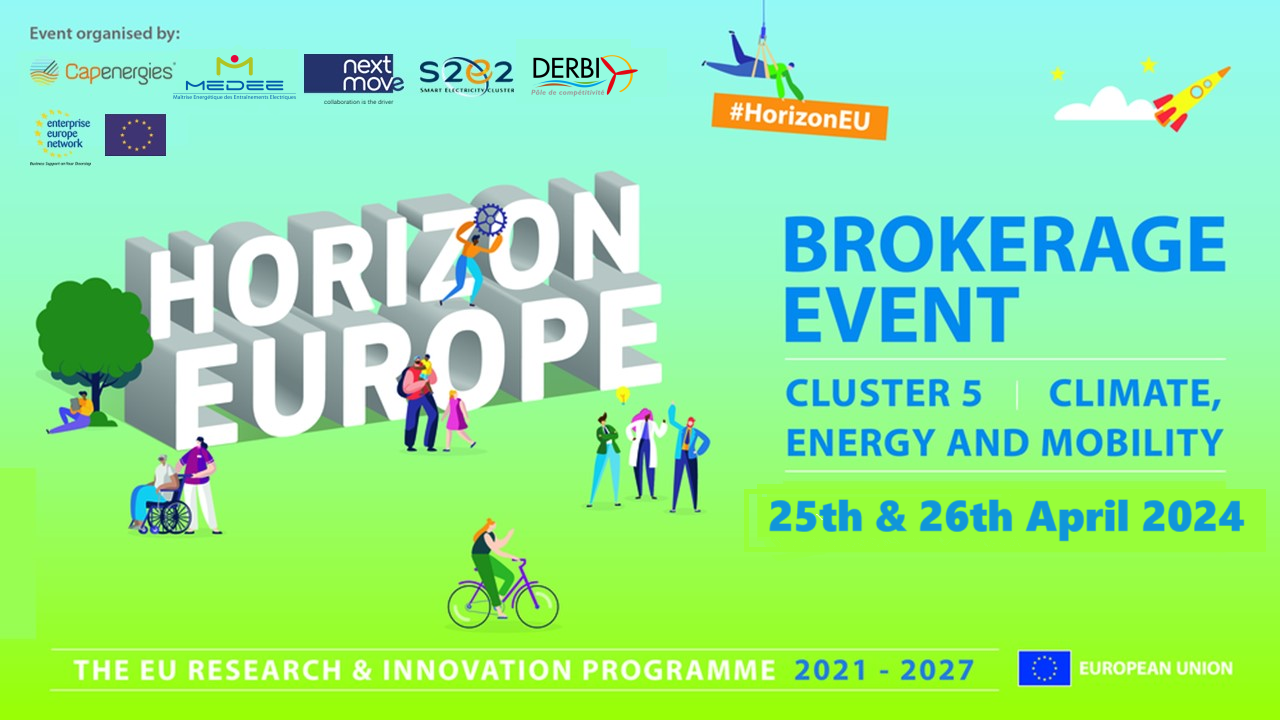
Matchmaking Horizon Europe - Cluster 5
Smart Energy Alliance (SEA) partnership, linked to energy and mobility, the European Commission's Enterprise Europe Network (EEN) and the French national contact points are organising a matchmaking session.
The event focuses on the following Horizon Europe 2024 calls, more specifically on Destinations 2, 3 and 6 of Cluster 5 (Topics: Climate, Energy and Mobility), whose deadline is the 2nd half of 2024:
- Cross-sectoral solutions for climate transition
- Sustainable, secure and competitive energy supply
- Efficient, sustainable and inclusive use of energy
- Safe and resilient transport and smart mobility services for passengers and goods
Find out more and register here.
Programme
Thursday 25 April - Opening session and round tables Horizon Europe 2024
- 9:00- 9:10 : Introduction (Raphaël Rinaldi Director Europe/International CAPENERGIES)
- 9:10- 9:30 : Keynote 1 - BEPA Association
- 9:30-9:50 : Keynote 2 - CCAM Partnership
- 9:50- 10:20 : Intervention PCN Energie & Transport (content TBC)
- 10:20- 10:30 : Break
- 10:30- 11:45 : Pitch session (Speakers TBC)
- 12:00 : Clôture de la session
Thursday 25 and Friday 26 April - BtoB meeting session
Why participate?
- Discuss and refine your projects with potential partners
- Establish collaborations and join consortia
- Get to know the European ecosystem on the targeted topics
- 25/04/2024 - 09:00 - 26/04/2024 - 17:00
- This meeting will take place online
- Gaia Ialisa Marotta
-
Working Group
Gaia Ialisa Marotta

Call for short position papers on HE & FP10 from the Commission Expert Group on the Interim Evaluation of Horizon Europe
The Expert Group on the Interim Evaluation of Horizon Europe, which will advise the Commission on the future European Framework Programme for R&I (FP10), kicked off its activities in December 2023. The Group's work will continue until October 2024, when the report on how the EU Framework Programme for R&I can continue to add value for the remainder of Horizon Europe and in the future, is expected.
While the Group will have access to a large amount of data, it wishes to further involve key stakeholders in their work and to benefit from their insights and feedback. With this in mind, the Group is calling for short max. 2-page position papers from institutional actors.
ERRIN will prepare a position paper for the attention of the Expert Group, building on the responses from members to the still open internal survey on FP10, as well as on the activities and exchanges organised by the network so far.
All ERRIN members are also invited to submit their own position papers to the Group. In this case, we encourage you to share them also with the ERRIN Secretariat by sending an email to ewa.chomicz@errin.eu . This will benefit our further work on FP10 by allowing us to take your points into account and gather a variety of perspectives.
The max. 2-page position papers should address the following four questions:
-
What major challenges (scientific, social, economic, technological) should still be attempted to be addressed in the second half of HE (2025-27) and further addressed by a future FP (FP10)?
-
Which are the major successes of the current HE (2021-2023) and which are the major “roadblocks”/threats to success?
-
Which sub-programmes of HE should be to be preserved and strengthened in a future FP (i.e., FP10) and which should be altered? How far a future FP (i.e. FP10) should keep/alter the current basic three-pillar architecture of HE (i.e. Pillar 1: Excellent Science; Pillar 2: Global Challenges and European Industrial Competitiveness; Pillar 3: Innovative Europe)?
-
What would be a catalyst to overcome the current roadblocks of HE and be implemented in a future FP (i.e. FP10)? What should be the most important innovations to be considered in a future FP (i.e. FP10)?
The Group recognises that providing concise responses will involve more effort, however, this is what they are seeking - to supplement the extensive data already at their disposal.
There is no deadline for submitting the inputs, but as its work continues, the Group encourages sending them in as soon as possible. The papers should be sent to: RTD-G2-HE-INT-EVAL-EG@ec.europa.eu
Don't forget to forward your papers also to ERRIN Secretariat to ewa.chomicz@errin.eu
- Ewa Chomicz
- 21 March 2024
Ewa Chomicz
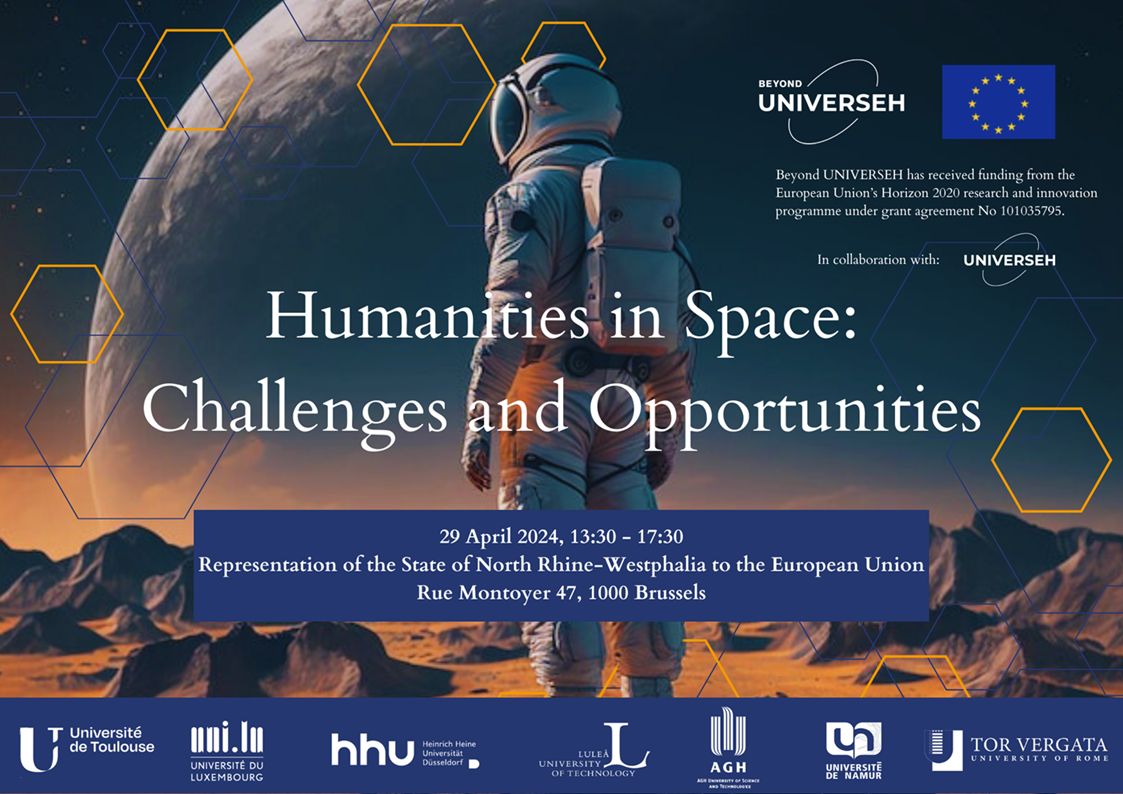
Humanities in Space: Challenges and Opportunities
Space exploration is an area of research traditionally associated with science and technology. However, many key questions regarding space also concern social sciences and humanities, as space activities have clear social, cultural, and economic impacts on our societies. Clearly, there is a need for such a multidisciplinary approach. Therefore, the Beyond UNIVERSEH event aims to explore the importance of the humanities for space research with experts on the matter and to enable networking between policymakers, companies, researchers, and interested citizens.
The Heinrich Heine University will be hosting the event around "Humanities in Space: Challenges and Opportunities" in the centre of Brussels on Monday, 29 April 2024, from 13.30–17.30.
General Agenda
13.30 Registration
14.00 Beginning of impulse speeches and panel discussion
16.00 Networking with drinks and snacks
17.30 End of the event
Please fill in the attached registration form and send it here by 14 April.
We are honoured to have the following panellists participating:
University of Namur
Prof. Dr. Annick Castiaux
(Rector)
Heinrich Heine University Düsseldorf
Prof. Dr. Stefan Marschall
(Vice Rector of International Affairs)
Dr. Jens Temmen
(Assistant Professor in English and American Studies)
University of Toulouse
Prof. Dr. Christina Stange-Fayos
(Vice-Chair responsible for European and International Relations and
Lead of the UNIVERSEH Humanities Group)
Prof. Dr. Vincent Simoulin
(Sociology Professor and Lead of the UNIVERSEH Humanities Group)
University of Luxembourg
Ms. Laetitia Cesari
(PhD student in Space Law)
If you have any questions, please contact Sonja Bretschneider (sonja.bretschneider@hhu.de).
- 29/04/2024 - 13:30 - 29/04/2024 - 17:30
-
Representation of the State of North Rhine-Westphalia to the EU
Rue Montoyer 47
1000 Brussels
Belgium - Marie Vaugeois
-
Working Group
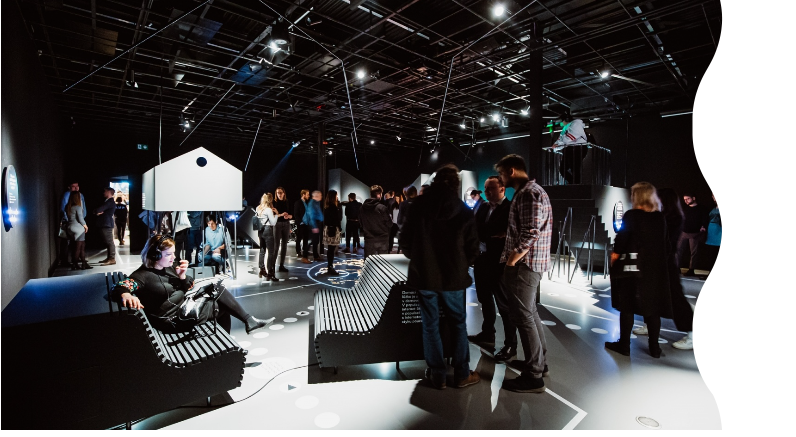
The Role of Art in the NEB-inspired Urban Transition
The CrAFT project is hosting an event looking at the role of art as a powerful tool for engaging the public in conversations about advancing our cities.
This 4-hour thought-provoking event will be divided into two parts. First, an artistic method of deeper engagement of city dwellers with their environment will be presented. Because to connect means to care, participants will also try this technique themselves and will directly feel the effects of an immersive experience. A discussion where we delve into the intersection of art, creativity, and participation of citizens in urban innovations will follow.
A panel of experts drawn from diverse backgrounds in art, technology, immersive theatre, experience learning, and design thinking will explore how art and creativity can effectively convey the impact of innovation in physical spaces – platforms – that the city would manage. How should such a space look and function, and what are some examples of good practice?
From interactive installations to immersive experiences, discover how creative and innovative approaches can bridge the gap between city officials, experts, politicians, and the general public.
The deadline to register is 8 April 2024. Find more information here.
- 11/04/2024 - 09:00 - 11/04/2024 - 13:00
-
Prague House Brussels,
Avenue Palmerston 16
1000 Brussels
Belgium - Francesca Pozzebon
